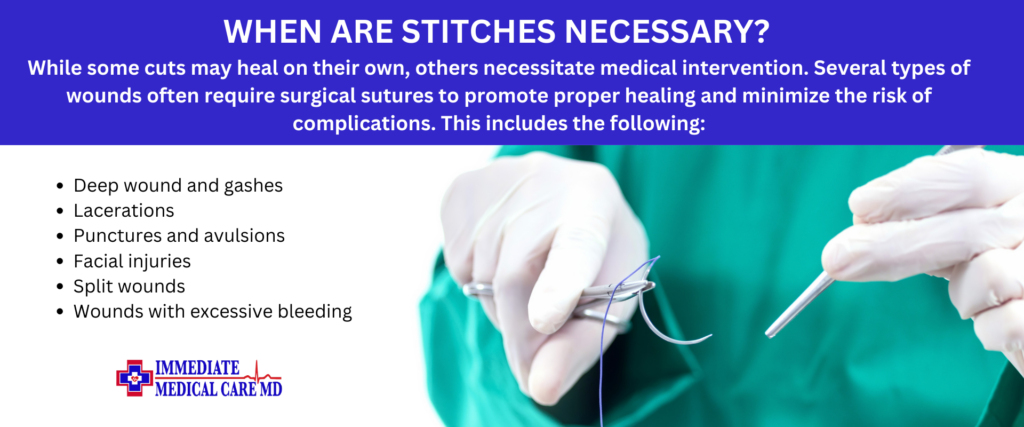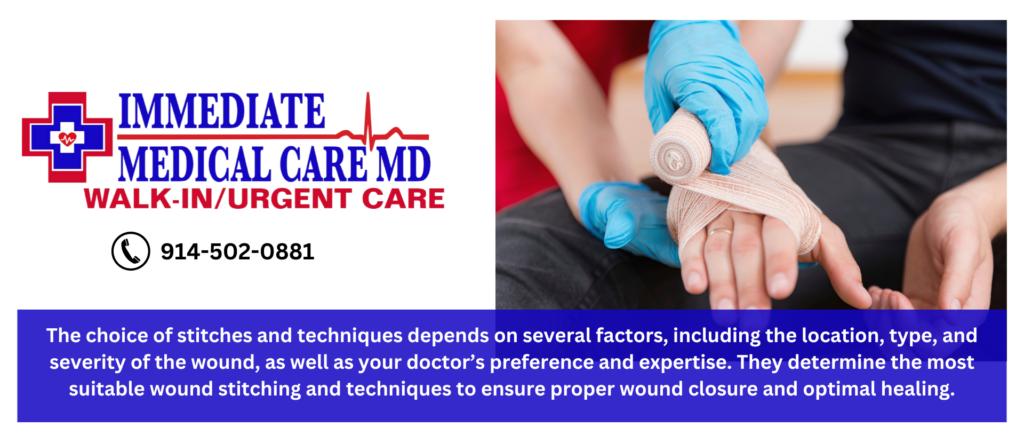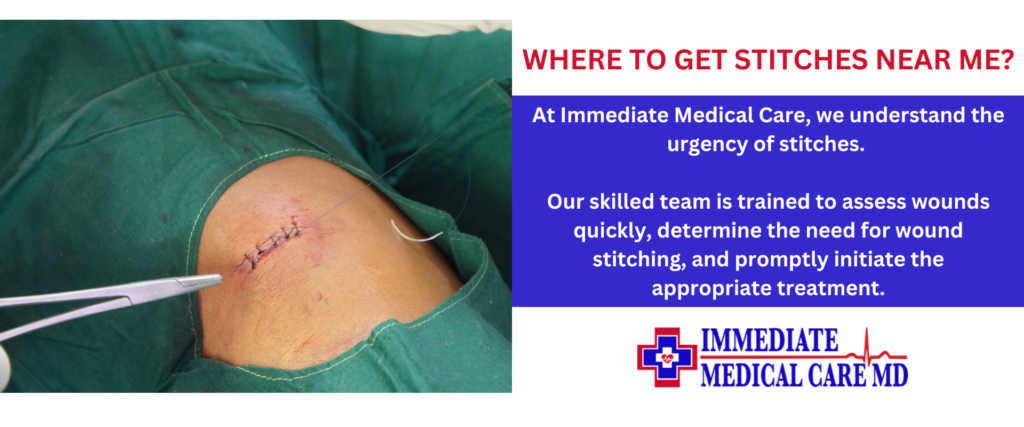Urgent Care for Stitches: Everything You Need to Know About Sutures
Whether you’ve experienced a nasty cut, a deep gash, or a laceration, stitches are often the solution to ensure proper wound closure and promote healing.
In this blog post, we’ll cover everything you need to know about stitches, from their importance to the process of getting them in an urgent care setting. So, let’s dive in!
What are stitches, and why are they needed?
Stitches, also known as sutures, are medical procedures used to close wounds and facilitate the healing process. When you have a cut that is too deep or has edges that won’t naturally come together, stitches are necessary to bring the skin back in place and promote proper healing.

Their primary purpose is to hold the wound edges together, minimizing scarring and reducing the risk of infection.
When are stitches necessary?
One of the critical aspects when it comes to sutures is determining whether your wound requires them. While some cuts may heal on their own, others necessitate medical intervention. So, how can you tell if you need to go to urgent care for stitches? Here are a few factors to consider:
Length and depth of the wound
If the cut is over half an inch (around 1.25 cm) or extends to deeper layers of skin or underlying tissues, surgical sutures are often required.
Wound edges
If the wound edges don’t naturally come together or have significant separation, stitching may be necessary to properly align and close the wound.
Bleeding
If the bleeding doesn’t stop or is difficult to control even with direct pressure, it’s a sign that the wound may require stitches to aid in hemostasis.
Location of the wound
Wounds on highly visible areas, joints, or areas prone to movement (such as hands or feet) often benefit from sutures to ensure proper healing and minimize the risk of complications.
Presence of foreign objects
If there are any foreign objects embedded in the wound, such as glass or debris, stitches may be necessary after their removal to facilitate healing and reduce the risk of infection.
Several types of wounds often require surgical sutures to promote proper healing and minimize the risk of complications. This includes deep cuts, gashes, lacerations, punctures, avulsions, facial injuries, wide abrasions, split wounds, or with excessive bleeding.
What are the different types of stitches and techniques?
Not all surgical stitches are created equal! There are various types and techniques employed based on the nature and location of the wound. Common suture types include the following:
- Suture stitches
- Interrupted stitches
- Continuous or running stitches
- Absorbable stitches
- Non-absorbable stitches
- Nylon stitches
- Polypropylene stitches
- Silk stitches
- Adhesive or steri-strips
- Dermabond
The choice of stitches and techniques depends on several factors, including the location, type, and severity of the wound, as well as your doctor’s preference and expertise. They determine the most suitable wound stitching and techniques to ensure proper wound closure and optimal healing.
What to expect when seeking urgent care for stitches?
When you arrive at urgent care for stitches, the process typically begins with an assessment by a healthcare professional. They will examine your wound, evaluate its severity, and determine the most appropriate course of action.

Your physician will then explain the procedure, ensuring you have a clear understanding of what to expect. Rest assured, urgent care in Ossining are well-equipped to handle sutures promptly and efficiently.
How to care for stitches at home?
Once your surgical stitches are in place, proper care is crucial for successful healing. Furthermore, it is an essential step that can prevent infection and minimize the risk of complications.
A nurse or a doctor will provide detailed instructions on caring for your wound sutures at home. Here are some general guidelines to follow:
1. Keep the wound clean and dry.
Cleanliness is crucial for preventing infection. Gently clean the area around the sutures with mild soap and warm water. Avoid scrubbing the wound, as it may disrupt the stitching. Pat the area dry with a clean towel.
2. Follow the recommended dressing changes.
Your healthcare provider will provide instructions on how often to change the dressing or if any specific products are needed. Some wounds may require a sterile dressing, while others may be left open to the air. Follow these instructions carefully.
3. Avoid getting the stitches wet.
In the initial stages of healing, it’s important to keep the surgical stitches dry. Avoid prolonged exposure to water, such as swimming or soaking in a bathtub. If the wound needs to be protected during showering, cover it with a plastic bag or waterproof dressing.
4. Minimize strain and movement.
Avoid activities that may strain the wound suture or cause excessive movement in the area. Follow your healthcare provider’s advice on restrictions and limitations. This helps prevent the stitches from being pulled or torn.
5. Avoid picking or scratching.
It’s essential to resist the urge to pick at or scratch the sutures. Doing so can disrupt the healing process, increase the risk of infection, and lead to scarring. If you experience itching, gently pat the area or use a cold compress to alleviate the sensation.
6. Watch for signs of infection.
Monitor the wound closely for any signs of infection, such as increasing redness, swelling, warmth, pus, or a foul odor. Also, watch for symptoms like excessive pain or fever. If you notice any concerning signs, contact your healthcare provider.
7. Protect the wound from the sun.
If the stitched area is exposed to the sun, cover it with clothing or apply sunscreen once the wound has healed and the sutures are removed. Sun exposure can cause the scar to darken or become more noticeable.
8. Follow up with your healthcare provider.
Attend all scheduled follow-up appointments with your healthcare provider to ensure proper healing progress. They will examine the wound, remove the stitches when necessary, and provide further instructions based on your recovery.
When and how are sutures removed?
The duration for which stitches need to remain in place varies depending on the location and severity of the wound. Generally, surgical stitches are removed within 7-14 days.
You must go to your physician at urgent care for stitches removal. Removing wound sutures is a quick and relatively painless process performed by a healthcare professional.
Once the wound sutures are removed, it’s important to continue proper wound care, keeping the area clean, moisturized, and protected from the sun to prevent scarring.
Frequently asked questions about sutures
1. Does getting stitches hurt?
The area is usually numbed before stitching, so discomfort is minimal during the procedure.
2. Can I shower with surgical stitches?
It’s generally advised to keep stitches dry, but your healthcare provider may provide specific instructions for showering.
3. Will surgical sutures leave a scar?
Scarring is possible, but proper wound care and techniques employed during stitching can help minimize scarring.
4. What if my sutures come undone?
Contact your healthcare provider immediately if this occurs to prevent infection or further complications.
5. Can I exercise with stitches?
Avoid strenuous activities or exercises that may strain the wound or cause it to reopen until your healthcare provider advises otherwise.
6. What signs of infection should I watch for?
Increased redness, swelling, pus, or worsening pain are signs that should be reported to your healthcare provider.
7. Will I need additional treatment after the sutures are removed?
Follow-up care and further treatment depending on the wound’s healing progress and your healthcare provider’s assessment.

Where to get stitches near me?
When it comes to sutures, prompt and professional care is crucial for optimal healing and minimizing complications. So if you require one, then it’s best to visit the best urgent care near me.
At Immediate Medical Care, we understand the urgency of stitches. Our skilled team is trained to assess wounds quickly, determine the need for wound stitching, and promptly initiate the appropriate treatment.
Best Urgent Care in Westchester
Our experienced healthcare professionals are dedicated to providing exceptional treatment, ensuring your well-being and peace of mind. Some of the services we offer at our Westchester urgent care facility include:
- Urgent care services
- On-site diagnostics
- Vaccinations and immunizations
- Covid-19 testing
- Sports physicals
- Immigration physicals
- And more!
With minimal wait times, we prioritize your comfort and ensure that you receive timely medical attention. Your well-being is our priority, and we are here to ensure your comfort and successful recovery.
Contact us now to learn more.
The material contained on this site is for informational purposes only and DOES NOT CONSTITUTE THE PROVIDING OF MEDICAL ADVICE, and is not intended to be a substitute for independent professional medical judgment, advice, diagnosis, or treatment. Always seek the advice of your physician or other qualified healthcare providers with any questions or concerns you may have regarding your health.
